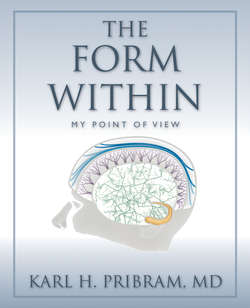Читать книгу The Form Within - Karl H Pribram - Страница 74
На сайте Литреса книга снята с продажи.
An Encounter
ОглавлениеSome years ago, during an extended period of discussion and lecturing at the University of Alberta, I was rather suddenly catapulted into a debate with the eminent Oxford philosopher Gilbert Ryle. I had just returned to Alberta from a week in my laboratory at Stanford to be greeted by my Canadian hosts with: “You are just in time; Gilbert Ryle is scheduled to give a talk tomorrow afternoon. Would you join him in discussing ‘The Prospects for Psychology as an Experimental Science’?” I was terrified by this “honor,” but I couldn’t pass up the opportunity. I had read Ryle’s publications and knew his memorable phrase describing “mind” as “the ghost in the machine.” I thought, therefore, that during our talk we would be safely enveloped in a behaviorist cocoon within which Ryle and I could discuss how to address issues regarding verbal reports of introspection. But I was in for a surprise.
Ryle claimed that there could not be any such thing as an experimental science of psychology—that, in psychology, we had to restrict ourselves to narrative descriptions of our observations and feelings. He used the example of crossing a busy thoroughfare filled with automobiles, while holding a bicycle. He detailed every step: how stepping off a curb had felt in his legs, how moving the bicycle across cobblestones had felt in his hands, how awareness of on-coming traffic had constrained his course, and so forth. His point was that a naturalist approach, using introspection, was essential if we were to learn about our psychological processes. I agreed, but added that we needed to supplement the naturalist procedure with experimental analyses in order to understand “how” our introspections were formed. Though I countered with solid results of many experiments I had done on visual perception, I was no match for an Oxford don. Oxonians are famed for their skill in debating. Ryle felt that my experimental results were too far removed from experience. I had to agree that in experimentation we lose some of the richness of tales of immediate events.
About ten minutes before our time was up, in desperation, I decided to do just what Ryle was doing: I described my experimental procedure rather than its results. I compared the laboratory and its apparatus to the roadway’s curbs and pavements; I enumerated the experimental hazards that we had to overcome and compared them with the cars on the road; and I compared the electrodes we were using to Ryle’s bicycle. Ryle graciously agreed: he stated that he had never thought of experiments in this fashion. I noted that neither had I, and thanked him for having illuminated the issue, adding that I had learned a great deal about the antecedents —the context within which experiments were performed. The audience rose and cheered.
This encounter with Gilbert Ryle would prove to be an important step in my becoming aware of the phenomenological roots of scientific observation and experiment. Ryle’s “ghost” took on a new meaning for me; it is not to be excised, as in the extremes of the behaviorist tradition; it is to be dealt with. I would henceforth claim that: We go forth to encounter the ghost in the machine and find that “the ghost is us.”
